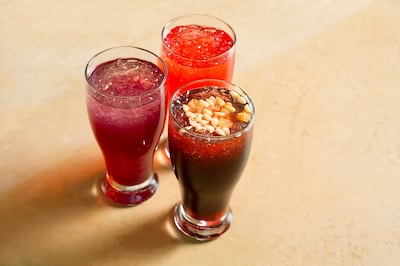One of Lebanon’s largest drinks producers is to set up a factory in nearby Cyprus to meet rising international demand.
But while the plan had been in the offing for a while, Nayef Kassatly, chief executive of Kassatly Chtaura, said a 2021 Saudi ban on Lebanese imports was the spark that triggered the move.
Kassatly Chtaura produces an array of alcoholic and non-alcoholic beverages that are sold in Lebanon, the wider region and elsewhere, and is credited with introducing bottled jallab syrup to Lebanon in the 1980s.
Mr Kassatly said the firm’s factory in Chtaura, Bekaa Vallery, did not have sufficient capacity to meet a surge in Middle Eastern and European demand for the carbonated non-alcoholic drink Freeze. The move, Mr Kassatly said, would strengthen the company’s presence in Europe and perhaps pave the way to the US as a future potential market.
He said the decision to set up at the 50,000 square metre area, expected to be up and running towards the end next year, near Limassol was also prompted by tax incentives. He was keen to stress that this was an expansion — expected to double production — and not a move away from Lebanon.
“I need to emphasise and stress on the point that it's not a relocation at all, it's an expansion to strengthen our roots at home,” he insisted.
About 100 jobs are expected to be created — a 50 per cent split between Lebanese and Cypriots.
Amid a 2021 diplomatic row between Saudi Arabia and Lebanon, Riyadh banned Lebanese imports. While tensions have cooled and the Saudi ambassador has returned to Beirut, Lebanese exports have not returned.
“The expansion plan was always there but what really triggered it and put it back on the table was the Saudi embargo” said Mr Kassatly, whose father Akram established the company in 1974. "Saudi represented 20 per cent of our exports; losing 20 per cent of your exports was a big hit for us.

“Fortunately for us, Freeze was booming everywhere else, and we had the excess in demand. But you know, when you lose a market it's not a fun thing to do. It was a reason to do this expansion outside Lebanon. It gave us a wake-up call to spread the risk.
“You know, we're in a volatile country, it's true, but it's our home. And we will, we will resist, we will maintain our presence. But having this insurance cushion across the Mediterranean half an hour away was not a bad idea.”
A devastating economic crisis that first became apparent in 2019 has pushed many in import-reliant Lebanon into poverty, with the local currency losing more than 95 per cent of its value against the US dollar.
There are widespread shortages in basic essentials including electricity, clean water and medicine.
But Mr Kassatly said the company was used to dealing with electricity problems in Lebanon, and relied on generators to regulate its supply while also looking into solar panels.
He said: “For 25 years we’ve been producing our own electricity, it's an ongoing problem that we that we've been juggling with.”

